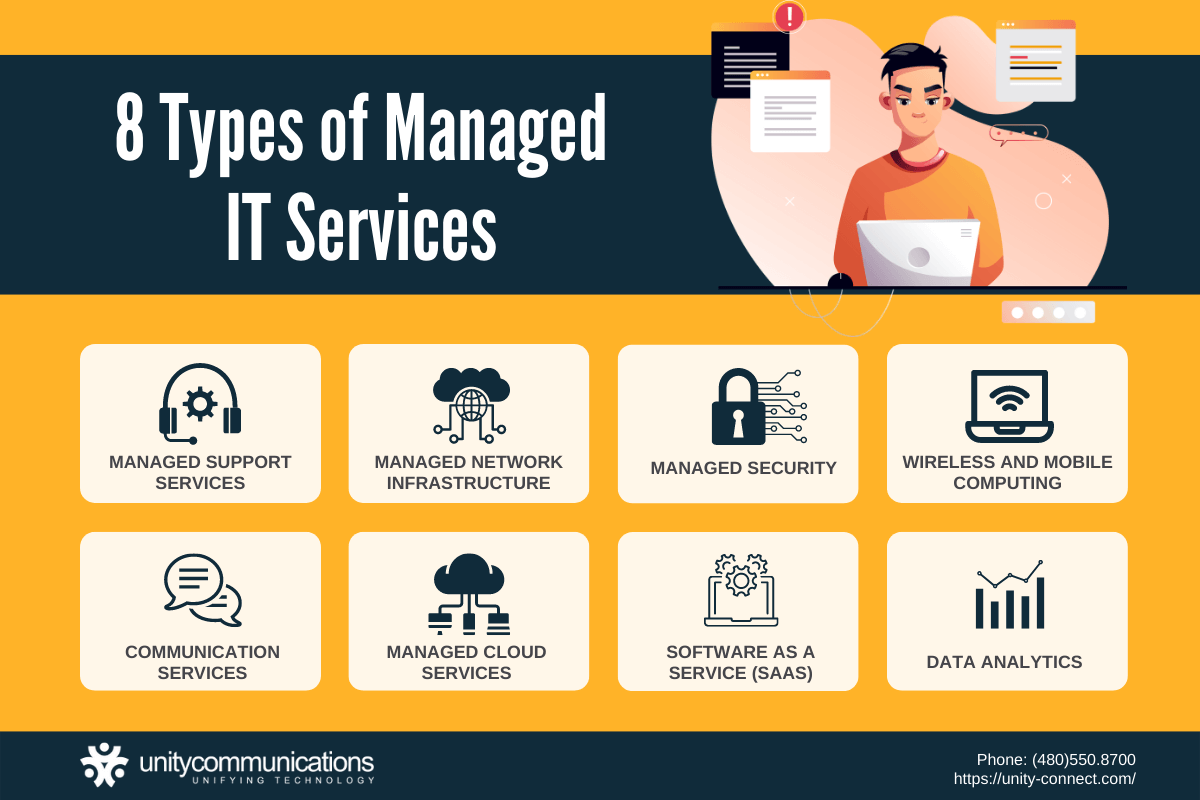Table of Contents
The fast-paced market competition and evolving business landscape challenge companies to stand out. They have to accelerate innovations to keep up with the latest trends. However, the increasing amount of back-office tasks prevents them from moving forward.
Fortunately, you gain a competitive advantage by delegating non-core functions to managed service providers (MSPs). Acquiring outsourced technical support lets you focus on enhancing your products and services.
But to ensure a good working relationship, you must know your potential MSP and its offerings. Here, you’ll discover the benefits, risks, and factors to expect when outsourcing your IT services.
What Are MSPs?

Managed service providers remotely operate IT infrastructure and end-user systems to support clients. These third-party companies perform day-to-day management tasks, including network and security monitoring. They also help prevent customers from experiencing prolonged system downtime and interruptions.
Many MSPs specialize in specific IT segments such as cybersecurity, help desk support, and information handling. Others run their businesses in vertical markets such as financial services, healthcare, and manufacturing.
As mentioned, MSPs differ based on the industry in which they operate. They also vary depending on the size of their target clients and the scale of responsibilities they assume. Below are the categories of MSPs.
- High-level MSPs deliver a wide range of IT-focused back-office outsourcing services.
- Pure-play MSPs provide small-scale tech services such as network monitoring.
- Staffing legacy MSPs cater to mid-level businesses and Fortune 500 companies.
Small, medium and large companies aiming to hire an MSP must also understand how it charges for its services. This will help them better plan an outsourcing budget to match their operational strategies and objectives. MSPs usually use the pricing models below.
- All-inclusive – a buffet-like flat fee for all IT management and support services
- Tiered – a bundle of services based on client needs
- Per-device – a fixed charge for each monitored device
- Monitoring-only – a payment option for IT infrastructure tracking and alerting
- Per-user – a service plan for accommodating each user with multiple devices
Eight Types of Managed IT Services

As application service companies began appearing in the 1990s, they initiated the growth of managed service providers. In their early days, MSPs solely performed remote server and network operations. They then expanded their service scope to distinguish themselves from other providers.
Now, vendors provide back-office outsourcing to take care of time-consuming and repetitive IT services. They offer such services through a fixed contract or a subscription model. Companies looking to reduce costs and streamline workloads hire MSPs to deliver managed IT services like the ones below.
1. Managed Support Services
Businesses transact with other companies and their customers daily. Their dealings involve large-scale processes, paperwork, and data exchange. IT departments strive to automate and streamline this work as much as possible.
To ensure smooth operations, companies spend considerable funds to hire professionals and deploy modern systems in-house. They use these resources to address various issues, but existing staff must be trained and infrastructure constantly updated so that problems can be resolved.
Here’s where MSPs take the spot. They provide managed support services covering all IT tasks, including technical support, desktop assistance, and troubleshooting. They perform such tasks quickly and accurately with a well-trained workforce and advanced software solutions.
Because MSPs specialize in this field, companies fully entrust their back-office functions to them. This advantage allows companies to focus on their primary capabilities and offerings. So even during peak season, they ensure their primary and non-core projects remain on track.
2. Managed Network Infrastructure
Network infrastructure is a crucial part of modern enterprise operations. It consists of hardware and software solutions that help businesses manage certain technologies. They also use these platforms to connect with multiple users, devices, and third-party networks.
Many companies hire managed service providers to reduce operating costs and take advantage of expert network operators. MSPs construct, use, and secure networks to support their clients. They deliver these products as a cloud infrastructure service or directly install and run them in their clients’ facilities.
Managed network support can include the following solutions and services to monitor back-end IP-based communication infrastructure and data.
- Servers, routers, and switches
- Operating system and firewall software
- Managed local area network (LAN) and wide area network (WAN)
- Managed gateway and wireless network
- Automated network support
3. Managed Security
According to the FBI’s 2021 Internet Crime Report, the Internet Crime Complaint Center received 23,903 complaints linked to technical support fraud from victims in 70 countries. The incident resulted in losses amounting to $347 million, up 137% year over year. Scammers imitate leading tech companies to repair nonexistent technology issues or renew subscriptions.
To avoid such threats, companies hire managed service providers to improve their protection. MSPs are specifically called managed security service providers (MSSPs) in this field. They commonly perform the tasks below to safeguard clients’ confidential data and assets.
- Firewall and patch management
- Intrusion detection
- Virtual private network
- Vulnerability scanning
- Antiviral service
- Security updates
- Multi-factor authentication
- Data encryption
- Risk management
- Threat mitigation
MSSPs monitor customers’ devices and systems using security operation hubs installed at their facilities or leased from other data center providers. These centers enable them to deliver 24/7 security support while minimizing the need to hire and train more personnel. Hence, companies gain excellent security at an affordable cost.
4. Managed Wireless and Mobile Computing
Wireless and mobile computing technologies give end users access to critical business data and digital resources while on the go. The systems consist of mobile devices such as laptops and smartphones and wireless network connectivity based on Wi-Fi or cellular data. They enable round-the-clock data storage, retrieval, and sharing.
Its convenience means that mobile computing has expanded applications across business and consumer markets, especially during the surge in remote work. It facilitates the internet of things for streamlined collaboration and communications. Companies also use the solution for healthcare, security, and surveillance.
Small and medium enterprises incapable of establishing their own wireless connections turn to MSPs for managed mobile computing. They get integrated mobile software tools and services to support remote or hybrid work setups. This capability provides their in-house teams with more flexibility, resulting in increased productivity and efficiency.
5. Managed Communication Services
Communication services are vital in helping businesses engage and maintain a good relationship with their customers. In Zendesk’s CX Trends 2022 report, consumers want quick, easy, and effective customer service. If they don’t receive such support, they’re willing to switch to another company.
Hence, IT businesses must consider speed and convenience when providing technical support and help desk services. They ensure their in-house employees and communication systems can accommodate massive customer inquiries. But to do that, they need to invest considerable funds in training their agents and deploying modern solutions.
Companies hire MSPs for cost-efficient customer support to avoid spending extra dollars on this non-core function. MSPs offer managed communication services that accelerate responses to repetitive customer queries. They use the following communication infrastructure to provide such services effectively.
- Contact center software
- Voice over internet protocol (VoIP)
- Chatbots
- Interactive voice response (IVR) system
- Robotic process automation (RPA)
- Videoconferencing
- Virtual assistance
- SMS and instant messaging applications
- Online multilingual help desk support
6. Managed Cloud Services
As technology evolves and global crises persist, many organizations adopt managed cloud services to perform digital transactions and online collaborations. Managed service providers partially or completely handle their clients’ cloud platforms. Their work encompasses various IT tasks, such as the ones listed below, to help speed up business operations.
- Cloud migration, maintenance, and optimization
- 24/7 omnichannel help desk support
- Web hosting and implementation
- Engineering on demand
- Automated task distribution
- Real-time data access and sharing
Delegating cloud management to MSPs allows companies to reduce hiring and training expenses. It also enables in-house IT teams to prioritize more complex projects. This advantage helps drive new business outcomes and generates more revenue.
7. Managed Software as a Service (SaaS)
Companies need software programs to ease their workloads and address backlogs. These solutions assist employees in accomplishing their tasks faster and more accurately. They also help avoid project delays and burnout, improving their core products and services.
For further convenience and cost efficiency, companies acquire subscription-based software solutions from managed service providers. In-house teams using managed SaaS gain unlimited access to all software features throughout their contract with an MSP. MSPs also provide updates and security patches for software products such as:
- Office productivity suite
- Universal communication software
- Antivirus software
- Video and photo editing platforms
- Media player
- Web browser
- Data backup and storage
- Task management and collaboration software
Companies must assess the SaaS included in a contractor’s service packages when outsourcing data entry. They must check whether the software tools match their existing systems and security measures to ensure time-saving and risk-free operations.
8. Data Analytics
Data serves as a central pillar of every company’s success. It’s essential to many administrative functions such as customer service and marketing. How businesses gather and use data significantly influences decision-making and project implementation.
Data-related activities slow down or hinder companies from working on their core projects despite their business value. If the same in-house team handles these labor-intensive tasks, employees spend much time organizing and assessing massive data from daily transactions. As a result, they encounter delays in developing and executing growth-focused initiatives.
Businesses thus outsource data entry services to ease workloads and reduce workforce burdens. Managed service providers have employees skilled in data management and analytics. They also use advanced software tools to perform the following work accurately and rapidly:
- Collect enterprise and customer data
- Categorize and manage datasets
- Monitor market trends and patterns
- Analyze changes in customer preferences and demands
- Produce reports and strategies for improving the company’s products and services
Benefits and Drawbacks of MSPs

In addition to understanding what an outsourced IT provider (which is an MSP) and its services are, you must also know the advantages and disadvantages it brings. These insights will help you align your managed service investment with your operating budget.
Below are the benefits and drawbacks of working with third-party companies.
Advantages
- Reduce expenses. Outsourcing eliminates the need to hire, train, and retain skilled employees. You also don’t have to deploy and maintain a complex IT infrastructure. MSPs already have these resources and provide them through affordable service packages.
- Emphasize core capabilities. Contractors train their workers to manage time-consuming IT tasks effectively. They also use advanced software solutions to automate repetitive processes. Hence, you can focus on enhancing your core capabilities, products, and services.
- Enhance scalability. As customer demands change and your business expands, your technology also needs to evolve. Vendors help upgrade your IT infrastructure to accommodate such evolving requirements. They deliver high-tech solutions and perform constant system monitoring for better scalability.
- Receive real-time support. Managed service providers optimize multiple cloud-based software solutions to streamline task completion. You can expect to receive 24/7 IT support in real-time.
- Improve security and compliance. MSPs earn their clients’ trust by implementing strict security measures. They also perform regular compliance checkups to avoid unexpected violations and sanctions.
Disadvantages
- Decrease business and IT synergy. Providers run multiple client accounts. Thus, they might not profoundly understand your in-house IT infrastructure and enterprise needs. This tradeoff allows them to reduce managed service costs for their clients.
- Lessen on-site availability. Third-party personnel performs managed IT tasks remotely. So they can’t fix urgent issues requiring physical presence. Vendors can’t also provide on-site support if they don’t have a local office.
- Reduce knowledge retention. You might experience a reduced ability to retain your business knowledge and develop your own IT processes when outsourcing. This can lead to inconsistent outcomes and hinder data sharing across your business units.
- Excessively rely on managed services. Too much dependence on MSPs to handle your back-office tasks leaves you unprepared for unforeseen conflicts. You might encounter system downtime and project delays if you don’t engage actively with your provider.
When To Outsource IT Services

Many factors influence companies’ decisions to outsource some or all of their IT functions. The listed benefits above can encourage you to try out managed support services. Meanwhile, the drawbacks make you hesitant to hire an MSP.
Whether in-house or third-party, you need an IT team to help your business run smoothly and efficiently. Your tech resources enable you to thrive. Consider these signs if you’re planning to outsource your IT services.
- In-house IT employees with specific skills demand higher income and compensation as their tenure extends. Consistent infrastructure maintenance and modernization also add to operating expenses.
- System features are updated almost daily to keep up with the latest market trends and demands. The lack of sufficient resources to accommodate these upgrades results in poor business performance and setbacks.
- The inability to monitor and update enterprise systems makes them prone to security threats and cyberattacks.
- Workers spend more time completing IT tasks than focusing on core functions. Having the same team handle customer responses and perform technical fixes leads to burnout and overwork.
The Bottom Line
Technology provides enterprises of all sizes with a competitive advantage in our rapidly changing markets. They must ensure their IT units have enough resources to operate effectively. However, spending considerable funds on non-core functions doesn’t ensure returns.
Managed service providers help companies streamline their repetitive tasks while reducing operating costs. They deliver managed services based on specific business needs. Although contracting them still poses risks, they allow companies to prioritize their revenue-generating projects.
After understanding MSPs and how you can benefit from them, you’re now ready to plan your IT outsourcing investment. Add Unity Communications to your list of potential providers. The Inc. 5000 company will help you execute tech projects on time and above expectations while saving on costs.




